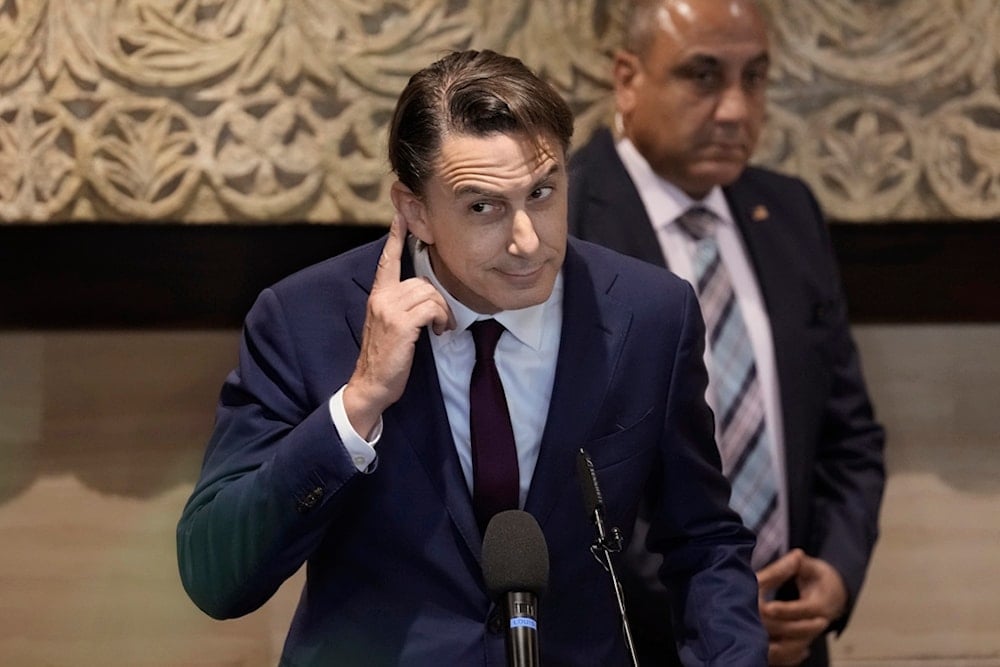US envoy Hochstein tells 'Israel' not to risk 'costly' war in North
Senior US Presidential Advisor Amos Hochstein warns the Israeli occupation not to get involved in a conflict with Hezbollah amid escalating tensions in the region.
-

Senior Advisor to US President Biden Amos Hochstein during a press conference following his meeting with Parliament Speaker Nabih Berri in Beirut, Lebanon, Tuesday, June 18, 2024 (AP)
The United States has expressed a clear stance against escalation in the North, emphasizing that it does not want a war in the North and is keen to prevent it at any cost, Israeli Channel 12 reported.
Dana Weiss, a political affairs analyst for the Israeli occupation's Channel 12, revealed that the US conveyed a message to Israeli leadership, stating, "Do not embark on such an adventure. Do not start a war in the North. It will carry a very heavy price."
Weiss further noted that both the Americans and Israelis understand that a war with Hezbollah could lead to a multi-front conflict for the Israeli occupation, which would inevitably draw the US into the fray.
Weiss suggested that Washington's decision to send US President Joe Biden's special envoy Amos Hochstein to Tel Aviv is part of a broader effort to reach a settlement. She added, "The problem is that such a settlement is also linked to a ceasefire in the South." In this context, Weiss framed Washington's efforts as an attempt to propose a resolution that would allow for a prisoner exchange and ceasefire.
Another Israeli media outlet echoed this sentiment, confirming that Hochstein had already delivered the US message to the Israeli occupation, advising it to "refrain from a large-scale operation in Lebanon."
"The Americans can smell the elections and don't have time to get embroiled in wars right now [...] from the American perspective, Israel can endure until January 2025 when a new US president takes office," the outlet added.
'Strategic mistake'
The US sentiment echoes that of former Israeli Prime Minister Ehud Barak, who said Sunday that the Israeli occupation was struggling without a clear plan for the future, and it was closer to defeat than achieving a full victory.
In an interview with Israel Hayom, Barak remarked, "The reality is harsh. Israel did not win on October 7, nor has it won the ongoing war. In fact, we are nearer to defeat than to victory."
He warned that the Israeli occupation is "just a step away from defeat, not absolute victory," and that the situation could escalate into a full-scale war. Barak stressed the importance of working with the United States and other moderate nations to prevent such an outcome.
Regarding the potential for a war with Lebanon, Barak highlighted the risk of a broader regional war if the occupation engages Hezbollah. He called this a potential "strategic mistake" that could come with a heavy and painful price.
He emphasized the importance of preventing war in the north, arguing that any conflict there would likely not yield better results than could be achieved through a negotiated agreement.
Barak also addressed the issue of prisoners, urging the Israeli occupation to complete a prisoner exchange deal and halt the war in Gaza, even if it means accepting an "exchange of all prisoners."
He added that while "Israel" must prepare for a potential all-out war with Hezbollah, it should first finalize the prisoner exchange and focus on preventing further escalation. According to Barak, calming the situation in Gaza through a prisoner deal could lead to a de-escalation in the north as well, even if the agreement is only temporary.

 3 Min Read
3 Min Read










